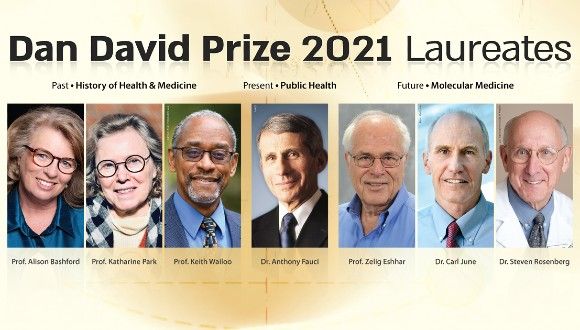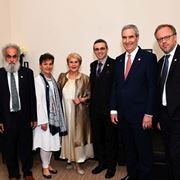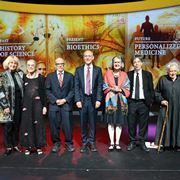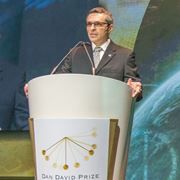Dan David Prize 2021 Laureates in Health and Medicine Announced
This year’s Dan David Prize laureates are Director of the National Institute of Allergy and Infectious Diseases (NIAID) Dr. Anthony Fauci; health and medicine historians Prof. Alison Bashford, Prof. Katharine Park, and Prof. Keith Wailoo; and the pioneers of an anti-cancer immunotherapy Prof. Zelig Eshhar, Prof. Carl June, and Dr. Steven Rosenberg.
The laureates were announced live in an online event on February 15, 2021.
The internationally renowned Dan David Prize, headquartered at Tel Aviv University, annually awards three prizes of US $1 million each to globally inspiring individuals and organizations. The Prize honors outstanding contributions that expand knowledge of the past, enrich society in the present, and promise to improve the future of our world. The total purse of US $3 million makes this prestigious prize also one of the highest-valued awards internationally. This year’s fields are: History of Health and Medicine (Past category), Public Health (Present category), and Molecular Medicine (Future category).
The Laureates
History of Health and Medicine (Past Category)
A world-leader and an agenda-setter in the history of health and medicine, Prof. Alison Bashford’s wide-ranging work is unusually expansive across geographies, topics, and periods, and demonstrates the global interconnectedness of medicine and public health in the modern world. As one of the earliest analysts of the relationship between public health, disease control, and race, she galvanized historians of health and medicine worldwide around the question of quarantine and medico-legal border control. When the biosecurity threats of SARS, anthrax, and avian influenza amplified political insecurity in the early 2000s, she quickly convened scholars from diverse fields, curating and editing three books that have expanded our understanding of that complex global moment. One of them constitutes a major resource for understanding the current global pandemic. She currently serves as the Laureate Professor of History, UNSW Sydney, Australia.
Prof. Katharine Park is a professor emerita of the History of Science at Harvard University, and a pioneering scholar of medieval and early modern science and medicine. Her early scholarship focused on the medical profession in Renaissance Florence; applying an innovative approach, she surveyed “the entire world of medical practice” in the wake of the first plague epidemic in 1348. Her research re-orients what we thought we knew about medieval and Renaissance anatomy and places gender at the center of the analysis, demonstrating how this can provide radically new insights. Combining conceptual temerity, visionary analysis, and methodological innovation, her work has revitalized the field and is reshaping our understanding of gender, sexuality, and the [female] body in pre-modern societies.
Professor of History and Public Affairs at Princeton University, Keith A. Wailoo’s research is shedding new light on hidden health experiences in the past, from pain management to the way cultural values shape ideas about cancer, or how sickle cell disease emerged from medical invisibility to become a focal point of debate in the U.S. over race, health equity, and social justice. He is redefining the social history of American medicine, by positioning the issue of race at its heart. By forcefully bringing a historical perspective into public commentary and policy discussions on topics ranging from the opioid crisis to the politics of vaccination and COVID-19, he is advancing a broad understanding of health and health equity.
Public Health (Present Category)
Dr. Anthony Fauci, M.D., is the consummate model of leadership and impact in public health. As the director of the National Institute of Allergy and Infectious Diseases (NIAID) at the U.S. National Institutes of Health since 1984, he oversees an extensive research portfolio focused on infectious and immune-mediated diseases. He is widely respected throughout the world for his efforts to develop novel diagnostics, therapeutics, and vaccines against COVID-19. As the COVID-19 pandemic unraveled, he leveraged his considerable communication skills to address people gripped by fear and anxiety and worked relentlessly to inform individuals in the United States and elsewhere about the public health measures essential for containing the pandemic’s spread. In addition, he has been widely praised for his courage in speaking truth to power in a highly charged political environment. Dr. Fauci has also made many seminal contributions in basic and clinical research and is one of the world’s most-cited biomedical scientists. He was one of the principal architects of the President’s Emergency Plan for AIDS Relief (PEPFAR), which has saved millions of lives throughout the developing world.
Molecular Medicine (Future Category)
Prof. Zelig Eshhar is an immunologist at the Weizmann Institute of Science and the Tel Aviv Sourasky Medical Center, known for his pioneering work on T cells and chimeric antigen receptors (CAR) cancer immunotherapy. By combining antibodies with T-cell through genetic engineering, he created “killer” T cells, which have improved cancer recognition skills. His team was the first to employ the CAR -T cells to specifically fight cancer. He also worked to create unique antibodies for allergies. As an expert in monoclonal antibodies, Prof. Eshhar was invited to teach in developing countries and to advise many biotech companies. In a visit to another Dan David Prize laureate, Prof. Steven Rosenberg, Eshhar set the groundwork for the clinical application of his technology.
Prof. Carl June is a physician scientist and the Richard W. Vague Professor in Immunotherapy in the department of Pathology and Laboratory Medicine in the Perelman School of Medicine at the University of Pennsylvania and director of the Center for Cellular Immunotherapies at Penn’s Abramson Cancer Center. June and his lab discovered several basic scientific principles of how the cells in the immune system work to fight cancer and infections in the 1980s and 1990s. His lab would go on to conduct the first clinical evaluation of gene-modified T cells, initially in people with HIV/AIDS and then in patients with advanced leukemia beginning using CAR T cell therapy, the approach that retrains a patient’s own immune cells to attack cancer. The cellular therapy was awarded “Breakthrough Therapy” status by the FDA for acute leukemia in children and adults in 2014 and was approved as the first personalized cellular therapy for cancer, Kymriah, in 2017. It is now in use for the treatment of pediatric and adult blood cancer patients.
Dr. Steven Rosenberg is Chief of the Surgery Branch at the Center for Cancer Research, National Cancer Institute in Bethesda, Maryland and a Professor of Surgery at the Uniformed Services University of Health Sciences and the George Washington University School of Medicine and Health Sciences. He pioneered the development of gene therapy and was the first to successfully insert foreign genes into humans. He was also the first to demonstrate the effectiveness of genetically engineered CAR-T cells to mediate the regression of B-cell malignancies in humans, a treatment now approved by the FDA for widespread use. In recent work Dr. Rosenberg established new approaches for the application of immunotherapy to patients with a variety of common solid cancers by targeting the unique mutations present in the patient’s cancer. His recent studies of the adoptive transfer of genetically modified lymphocytes have resulted in the regression of metastatic cancer in patients with various types of tumors.
About the Dan David Prize
The Dan David Prize was established by the late Dan David, an international businessman and philanthropist whose vision is the driving force behind the international Dan David Prize. His aim was to reward those who have made a lasting impact on society and to help young students and entrepreneurs become the scholars and leaders of the future.
Previous Dan David Prize laureates include cellist Yo-Yo Ma (2006); former US Vice President Al Gore (2008); novelist Margaret Atwood (2010); filmmakers Ethan and Joel Coen (2011); distinguished economist and recent Nobel Laureate, Esther Duflo (2013); and artificial intelligence researcher, neuroscientist, and entrepreneur Dr. Demis Hassabis (2020).
The laureates donate 10% of their award money to scholarships for graduate or post-graduate researchers in their respective fields.
Prof. Ariel Porat, President of Tel Aviv University and Chairperson of the Dan David Prize Board said:
“The coronavirus pandemic has presented humanity with new challenges. Therefore, this year, we decided to honor the fields at the forefront of the battle against the virus - health and medicine. International review committees selected this year’s laureates for their pioneering work and their exceptional contributions to humanity in these fields, in three time dimensions – past, present and future.”
Ariel David, director of the Dan David Foundation and son of the prize founder, said:
“During the past year, we sought to address the challenges brought on by the COVID-19 pandemic. We chose to do so while staying true to the broad and diverse approach that distinguishes the Prize, recognizing achievements in a wide variety of fields that deal with issues of health, medicine and epidemiology. Our laureates for this year have probed how humanity has dealt with sickness and pandemics throughout history; they have provided relief, guidance and leadership in dealing with current outbreaks - from AIDS to Ebola and the Novel Coronavirus - and they are at the forefront of discovering new treatments that give us hope for the future in the ongoing battle against cancer and other diseases. I feel fortunate that we have the opportunity to celebrate their achievements and to remind ourselves that it is only by marshaling all the resources of the human intellect that we can trace a path through the darkest of crises."
The Prize’s unique model implements a ‘roving’ formula that rewards achievements in all fields of human endeavor, rather than in a fixed set of categories, and every year, a new theme is selected for each of the three time categories – past, present, and future.
The seven laureates will be honored at the 2021 Dan David Prize Award Ceremony, to be held in a special online event in May 2021.






